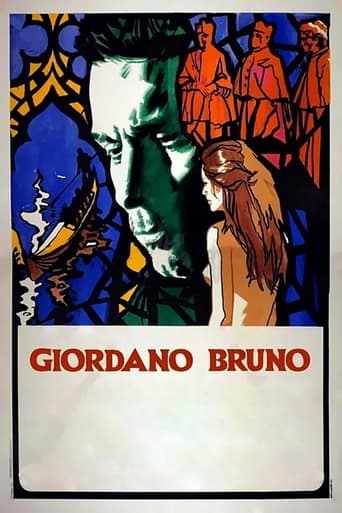Kirpianuscus
about freedom, knowledge, fight against prejudices. maybe, about the Church. Giordano Bruno becomes the symbol of the fight for ideas and ideals. for transform the philosophy as tool for everybody. for define the knowledge as supreme form of liberty. and for save an ideal, against the obstacles. a film who, for music and for the atmosphere, for the performance of Gian Maria Volonte and for the force of the last scenes, remains a must see. as political film, off course but, maybe more important, for the wise way to present and sustain ideals and force of faith. because, in fact, it is just a faith story. religious. but not only. the motif - the generous manner for give a touching, coherent and useful warning with universal impact.
clanciai
This is nothing less than a formidable film of almost excruciating force and power in its overwhelmingly correct realism in depicting the tremendous passion of this the greatest of free-thinkers, his denouncement by his best friend and host and the horrible inhumanity of the bureaucracy of the inquisition. When once in the hands of the inquisition, the system was simply so constructed, that it was impossible to get out again - no revocation could help, and all that Venice could do, being after all a republic out of papal control, was to wash their hands and hand the case over to others, leading to a constantly more desperately dwindling spiral of a process to perdition. Gian Maria Volonte is magnificent as Bruno, he couldn't have been made more convincing in his increasingly desperate argument and protests, showing also his very human sides, while the chief merit of the film is its marvellous visual language, often turning the film into pure expressionism, aided by the at times overwhelmingly apt music by Ennio Morricone. This is more than a film, it's an inspired passion of a film, showing Italian historical realism at its best. I didn't know this film existed before I stumbled upon it searching for something else, and starting to watch it there was nothing else to do but to see it through till the end. It should be made more widely known, and it is a good match and complement to the Neil Jordan's Borgia films last year.
David Traversa
An exquisite movie. I saw it two days ago and many of its images are still popping out in my mind. Other commentaries explain much better the story of Giordano Bruno that I could ever try to attempt, so I will only point out the magnificence of the interiors with frescos on every surface, with multicolored intarsio marble floors (The Vatican with the most exquisite and amazingly luxurious interior decorations ever dreamt by human minds --Titans of the visual effects to bring out the pathos in the viewer --believer--in this case). The appalling beauty of the Catholic Church prelates costumes (Armani, Oscar de la Renta, eat your hearts out!), their jewels, their tiaras, their gloves... My, my! The preciousness of the visuals in this movie reminded me of the movie "L'Innocente" ("The Innocent") by Visconti, equally jaded and ultra sophisticated with its exquisite details of costumes, jewelry and interiors. A surprising fashion show within a very serious picture! Volontè does an incredible job in his creation of Giordano Bruno, and everybody else in the cast is excellent. The script superb, as superb is the director. Only for grown ups (not because of obscenity, but because the concepts exposed in the lengthy dialogs are not easily digested by feeble minds).
dbdumonteil
Montaldo's precedent work was about America 's famous political prisoners Sacco and Vanzetti.Ennio Morricone's score was as excellent as usual and he asked Joan Baez to write four songs ,the words of three of them were taken from letters of Vanzetti.And there was Gian Maria Volonte who like Baez was a committed artist.Montaldo continued with politics in "Giordano Bruno".The scientist-philosopher ,played by Volonte again,was a visionary man extraordinaire ,so ahead of his time his thoughts seem sometimes contemporary.His world ,at the beginning of the modern times only knows two concepts:good and evil;it cannot free itself of the first conflict between God and Satan.God is not above ,says Bruno,he's everywhere ,in every plant,in every stone ,in every grain of sand of the creation.What the Holy(!) Office cannot forgive him ,outside this "heresy" is that he keeps on repeating that religion helps man dominate man,all that these cardinals are doing every day (who has the right to kill? says Bruno) Time had not come for science.Bruno's so called friend just wanted him to give him the power to dominate his fellow men.All that you could not understand was magic ,black magic .Like Sacco and Vanzetti,Bruno was a political prisoner ,a movie about him made sense after the 1971 work.And again,marvelous score by Morricone.


